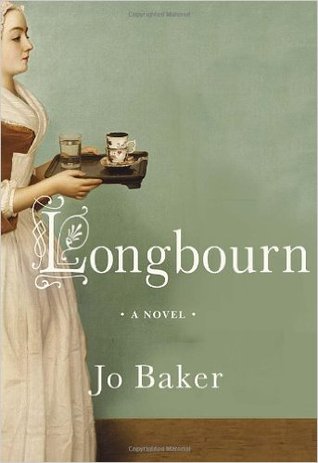
The Blurb (from Goodreads):
If Elizabeth Bennet had the washing of her own petticoats, Sarah often thought, she’d most likely be a sight more careful with them. In this irresistibly imagined belowstairs answer to Pride and Prejudice,the servants take center stage. Sarah, the orphaned housemaid, spends her days scrubbing the laundry, polishing the floors, and emptying the chamber pots for the Bennet household. But there is just as much romance, heartbreak, and intrigue downstairs at Longbourn as there is upstairs. When a mysterious new footman arrives, the orderly realm of the servants’ hall threatens to be completely, perhaps irrevocably, upended. Jo Baker dares to take us beyond the drawing rooms of Jane Austen’s classic—into the often overlooked domain of the stern housekeeper and the starry-eyed kitchen maid, into the gritty daily particulars faced by the lower classes in Regency England during the Napoleonic Wars—and, in doing so, creates a vivid, fascinating, fully realized world that is wholly her own.
My Thoughts:
What a brilliant premise this book has! Did you ever wonder – when reading Pride & Prejudice - about the lives of the servants toiling away quietly downstairs? No, me either. Jo Baker did wonder, however, and from that imagining has spun a beautiful, intense, heart-wrenching tale. Do not expect the wit and charm of Jane Austen; do not expect the well-beloved characters to be lauded. In fact, most of the cast of Pride & Prejudice come off badly – some are selfish and narcissistic, others merely oblivious. Do expect to have your understanding of the world of Jane Austen turned upside down and inside out, and made richer and truer as a result. Longbourne is driven by a strong sense of social justice, and we see just how hard life in Regency times could be for the poor and the weak. Much as I love Jane Austen, I always wondered why we heard nothing of the political turmoil of her times, nothing about the impassioned debate over slavery, nothing about the Napoleonic wars, nothing about the Luddites and the costs of the Industrial Revolution. Jo Baker has attempted to engage with many of these gaping holes in Jane Austen’s world, and has achieved a work of great beauty and serious intent. Longbourne caused an international bidding war and has already sold film rights, and I can certainly see why.
You might also like to read my review of Jane Austen at home by Lucy Worsley:

